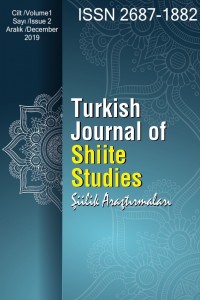Abstract
Prof. Hamid Dabashi’nin bu eseri, Şiiliğin, tarihsel düzlemdeki değişim ve dönüşüm dinamiklerini inceleyerek, İslam tarihi içerisinde oldukça önemli bir yere sahip olan bu mezhebin ihtilaf, başkaldırı ve uyuşma dönemlerine odaklanan bir perspektif sunmaktadır. Bu çerçevede, Freudcu psikanaliz teorisi yardımıyla Kerbela/matem olgusunun doğuşu ve Peygamber’in ehlinden bir sembol ismin öldürüldükten sonra kahramanlaştırılması hadisesinden hareketle, İslam tarihi boyunca Şiiliğin rejim/otorite karşıtı konumlanışı ve protest tavrı analiz edilmektedir. Dabashi bunu yaparken, sadece tarihsel figürlerden değil modern dönem fikir ve sanat adamlarının mücadeleci duruşlarından da faydalanmakta, nihayetinde 1979 Devrimi sonrası süreci değerlendirdikten sonra şu tespitiyle tarihsel süreci özetlemektedir: “Şiilik nihayetinde bir paradokstur, savaşçı olduğunda ve zahmetli bir savaş verdiğinde serpilip büyür ve muzaffer olur. Başardığı ve iktidara geldiği anda, manevi gücünü ve aykırı sesini kaybeder. Paradoksal olarak sadece, iktidarda olmadığı zaman iktidardadır. İktidara geldiği zaman, meşruiyetini, otoritesini ve cesaretini kaybeder.”
References
- Dabashi, Hamid. Shi'ism: A Religion of Protest (Harvard University Press, March 2011)
Abstract
Prof. Hamid Dabashi’s book, focusing on the dynamics of change and transition within the Shi’ite historical context, presents a panoramic perspective discussing conflict, uprising and conciliation periods of this significant sect within the history of Islam. Using Freudian psychoanalysis theory, Dabashi evaluates Shi’ite positioning against the regime and authority along with its protest discourse as a result of martyrdom at Karbala of Hossein, a grandson of the Prophet Muhammad. While discussing this process, the author not only analyzes the significance and fight of the historical figures but also modern ideologues and artists. At the end of his analysis on the 1979 Revolution, Dabashi summarizes entire historical process as; “It thrives and is triumphant when it is combative and wages an uphill battle; it loses its moral authority and defiant voice the instant it succeeds and is in power. It is, paradoxically, only in power when it is not in power—when it in power, it lacks legitimacy, authority, audacity.”
Keywords
References
- Dabashi, Hamid. Shi'ism: A Religion of Protest (Harvard University Press, March 2011)
Details
| Primary Language | Turkish |
|---|---|
| Subjects | Religious Studies |
| Journal Section | Book Review |
| Authors | |
| Publication Date | December 31, 2019 |
| Submission Date | August 31, 2019 |
| Acceptance Date | September 12, 2019 |
| Published in Issue | Year 2019 Volume: 1 Issue: 2 |

